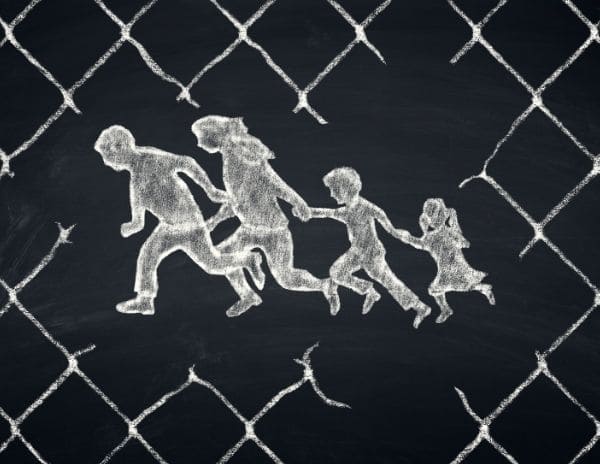Over the past few years, we have assisted several clients from different countries seeking refugee status; in all interviews, we received similar questions about how refugee status works in Bolivia. Thus, in this article, we summarize 15 questions and answer the most frequent doubts we have encountered:
- When can a person acquire refugee status in Bolivia?
Refugee status in Bolivia is granted for humanitarian reasons in favor of the applicant and their family if necessary. Due process must be exhausted to verify the existence of any of the circumstances under which it is possible to grant refugee status.
A person may acquire refugee status when there are well-founded reasons to establish that there is persecution for reasons of race, religion, political opinion, nationality, or membership in a particular social group.
Refugee status may also be granted to persons who consider that their life, safety or freedom is threatened by generalized violence, foreign aggression, internal strife, massive violation of human rights or other circumstances that have seriously disturbed public order in their country or place of habitual residence.
Finally, there are cases in which a person leaves the country without having any grounds for granting refuge. This person, however, can no longer return to their country because one of the circumstances mentioned above arises due to unexpected events occurring after his departure. In other words, after leaving the country, the person fully meets the circumstances or requirements to obtain refugee status.
- If a person has applied for refuge in Bolivia, can they be immediately returned or deported after arriving in Bolivian territory?
No, Bolivia recognizes the principle of non-refoulment, so no refugee or asylum seeker can be returned without due process; this includes people who have applied for shelter but whose applications are pending. It is expressly forbidden for applicants to be automatically returned to their country of origin or to another country where their life, safety, or freedom would be in danger.

- Can a refugee be extradited?
No. Since the recognition of refugee status is sufficient grounds for rejecting or denying the merits of any extradition request or proceedings initiated against them. Nevertheless, when the refugee application is pending, the extradition request is suspended until the refugee proceedings conclude; if the refuge is granted, extradition does not proceed. In contrast, if the refuge is rejected and has a final resolution, the extradition process would continue.
- When can a refugee be expelled from Bolivia?
In principle, no refugee or applicant for such status may be expelled from Bolivia; the expulsion could only occur after a due process that concludes the existence of internal security reasons of the State or public order that make the repatriation of the refugee necessary. It is important to note that the trial must comply with the Convention Relating to the Status of Refugees of 1951 and the National Legal System.
- Is it possible to criminally punish a refugee applicant for entering Bolivia irregularly?
No, because the Bolivian State is not allowed to impose criminal or administrative sanctions for irregular entry or presence of a refugee applicant.
- Is there a special discrimination regime for refugees?
Refugees in Bolivia should be treated like everyone else, national or fellow citizens; that is, without discrimination under Article 14 of the Political Constitution of the State and Law No. 045 Against Racism and All Forms of Discrimination.
- Can refugees bring their entire families to Bolivia?
The Plurinational State of Bolivia recognizes the unity of the family as a natural and fundamental element of society; thus, the refugee’s family unity is a right of the refugee. In this understanding, it is possible to extend the refugee status to the spouse, ascendants, descendants, and siblings who are economically dependent on the refugee and children, adolescents, and adults, who are under their guardianship.
But the limit for the extension of the refugee status is that the refugee’s family member or dependent has incurred in any of the following causes of exclusion:
- Who has committed crimes against peace, war crimes, or crimes against humanity, as defined in international instruments;
- Who has committed a serious non-political crime outside the country of refuge before being admitted as a refugee; or
- Who has been guilty of acts contrary to the purposes and principles of the United Nations.
In these cases, the extension of the refuge may not be granted.
- Is it legally acceptable for the refugee’s information to be disclosed by the Bolivian State?
No, any information relating to a refugee or applicant for such status is confidential; therefore, public servants and private entities involved in the application for refuge must refrain (except for exceptions) from disclosing or disseminating any information related to any refugee or applicant.
- What are the rights of the refugee and the applicant to refugee status?
The Plurinational State of Bolivia accords refugees or applicants the most favorable treatment possible. All refugees and applicants for such status enjoy all the rights and freedoms recognized in the national legal system and the international human rights instruments ratified by Bolivia, especially the rights recognized in the Convention relating to the Status of Refugees of 1951.
However, the applicant and their family members applying for refugee status throughout the procedure have the following rights:
- Be interviewed individually by a person of the same sex.
- Be assisted by a qualified interpreter or translator when the applicant’s language is not Spanish. This requirement is somewhat complex to meet because the native languages of some countries like Pakistan, Iran, Nepal, Russia, the Arab Emirates, or others are difficult to find in Bolivia. The person requesting refugee status should anticipate the need to locate a translator in advance to avoid further delays in the process.
- Receive a temporary document that allows you to remain in a legitimate situation in Bolivian territory.
- Receive information on their rights and obligations and the refugee status determination procedure.
- Be notified of CONARE’s decisions.
- Materially exercise their right to challenge the notified decisions of CONARE.
- Request certifications and legalizations related to their application.
- What are the duties of the refugee or applicant for refugee status?
All refugees and applicants for refugee status must abide by the Constitution and the laws and regulations in force in the Plurinational State of Bolivia; noncompliance with the Constitution and laws gives rise to the imposition of sanctions under the civil or criminal liability that may apply.
In this understanding, the applicant and their family members applying for refugee status throughout the procedure have the following duties:
- Provide reliable information about yourself and the facts and reasons that support your request.
- Provide evidence and provide explanations about the possible insufficiency or lack thereof.
- Provide clear and concrete answers to the questions asked in the interview.
- Establish legal address and contact details and immediately inform the competent authority of any relevant changes during your stay in Bolivian territory.
- Renew your temporary applicant document within the established period and as many times as necessary.
- Can a refugee application be considered a political act?
No, Bolivian law establishes that a person’s recognition as a refugee is an apolitical and humanitarian act which implies that refugees refrain from participating in political activities.
- Why could the status of a refugee cease?
A person’s refugee status could cease when any of the following grounds arise:
- If you have again voluntarily availed yourself of the protection of the country of your nationality;
- If having lost your nationality, you have voluntarily regained it;
- If you have acquired new citizenship and enjoy the protection of the country of your new nationality;
- If you have voluntarily resettled in the country you had left for fear of persecution;
- If, upon the disappearance of the circumstances for which you were recognized as a refugee, you cannot refuse to receive protection from your country of origin;
- If the circumstances for which you were granted refugee status no longer exist, you may return to the country of your habitual residence.
It is important to note that there is a proviso with the last two cases on the understanding that the status of a refugee who can invoke compelling reasons derived from severe persecutions before the disappearance of the circumstances for the granting of refuge or the lack of nationality would not cease.
- Could a refugee change their immigration status when the reasons for which they became a refuge have disappeared?
Yes, the Plurinational State of Bolivia may confer on the person dismissed as a refugee a legal status authorizing their stay in the country; for this purpose, the current immigration regulations consider the length of permanence, the degree of integration, family, and dependents.
- Is it possible to cancel refugee status if it is discovered that the information provided was false?
It is relevant to note that Bolivian law establishes that the refugee status recognition cannot be subject to ex officio review, except when the authorities have reliable news or have knowledge that the refugee concealed or misrepresented facts material to the refugee application. In this understanding, if the Bolivian authorities had known that the documentation presented was false, refugee status would have been denied and will be canceled.
- When could refugee status be revoked?
Refugee status may be revoked after being granted if the refugee has committed crimes against peace, war crimes, or crimes against humanity, as defined in international instruments; also, when they are guilty of acts contrary to the purposes and principles of the United Nations.

